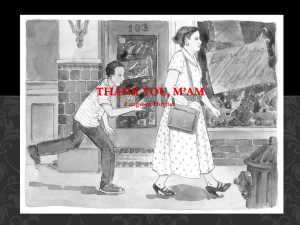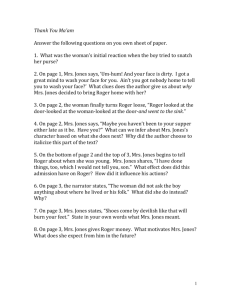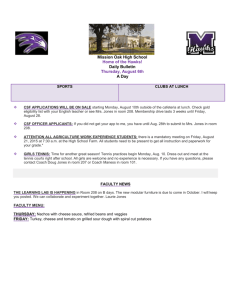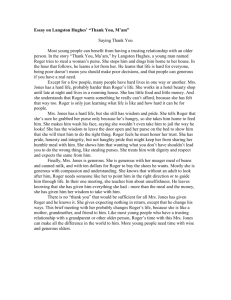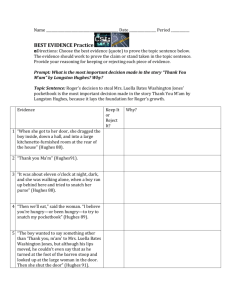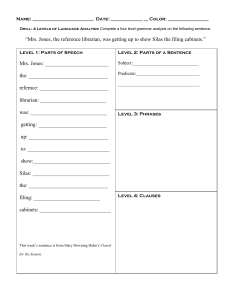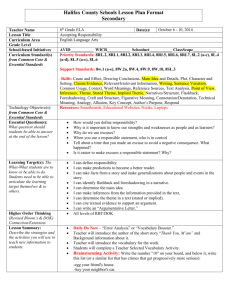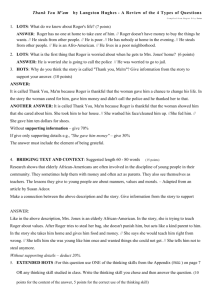THANK YOU, MA`M / Langston Hughes (questions and answers
advertisement
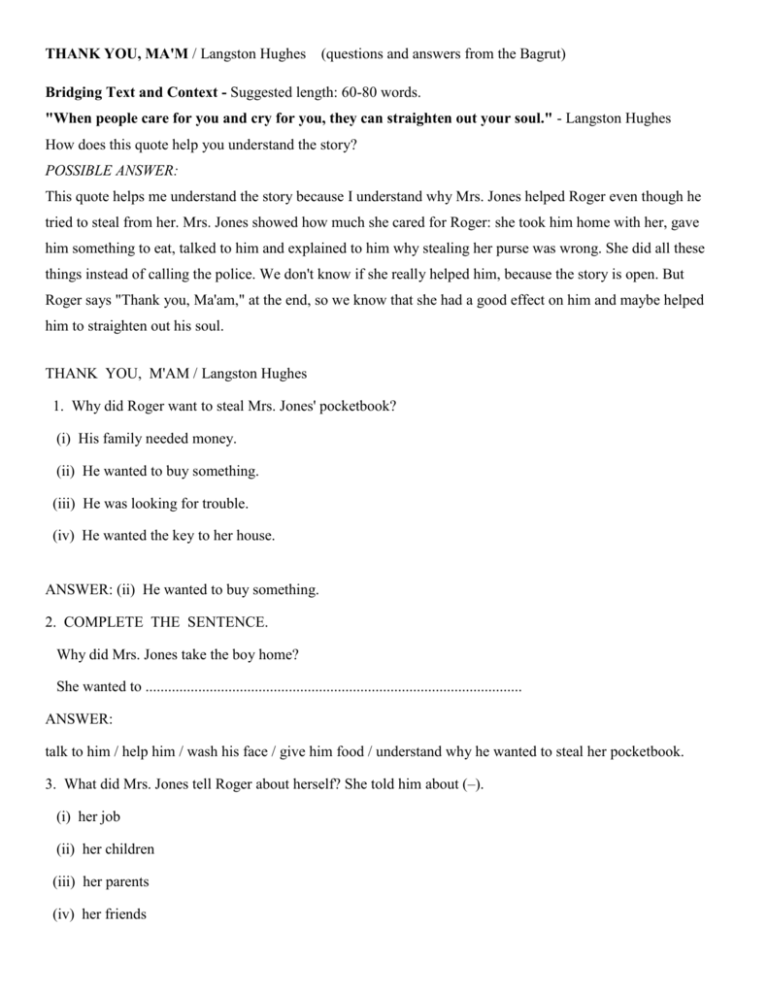
THANK YOU, MA'M / Langston Hughes (questions and answers from the Bagrut) Bridging Text and Context - Suggested length: 60-80 words. "When people care for you and cry for you, they can straighten out your soul." - Langston Hughes How does this quote help you understand the story? POSSIBLE ANSWER: This quote helps me understand the story because I understand why Mrs. Jones helped Roger even though he tried to steal from her. Mrs. Jones showed how much she cared for Roger: she took him home with her, gave him something to eat, talked to him and explained to him why stealing her purse was wrong. She did all these things instead of calling the police. We don't know if she really helped him, because the story is open. But Roger says "Thank you, Ma'am," at the end, so we know that she had a good effect on him and maybe helped him to straighten out his soul. THANK YOU, M'AM / Langston Hughes 1. Why did Roger want to steal Mrs. Jones' pocketbook? (i) His family needed money. (ii) He wanted to buy something. (iii) He was looking for trouble. (iv) He wanted the key to her house. ANSWER: (ii) He wanted to buy something. 2. COMPLETE THE SENTENCE. Why did Mrs. Jones take the boy home? She wanted to .................................................................................................... ANSWER: talk to him / help him / wash his face / give him food / understand why he wanted to steal her pocketbook. 3. What did Mrs. Jones tell Roger about herself? She told him about (–). (i) her job (ii) her children (iii) her parents (iv) her friends ANSWER: (ii) her job 4. "... shoes got by devilish ways will burn your feet." What did Mrs. Jones mean by this? ANSWER: If the boy steals the money to buy shoes he will not enjoy them. / If he steals he will get punished somehow. 5. a. At the end of the story "The boy wanted to say something else other than, 'Thank you, M'am,' to Mrs. Luella Bates Washington Jones, but... he couldn't even say that." What else besides "thank you" do you think Roger wanted to say to Mrs. Jones? Explain. NOTE: For this question use ONE of the thinking skills from the Appendix ) (חפסנon page 13. Thinking skill I chose: .............................................................................. ANSWER: Possible thinking skill: Explaining cause and effect / Inferring Any other thinking skills are acceptable as long as they are supported by the text and can be explained in question 5b. Possible information that would be adapted according to the thinking skill chosen: He might want to say to her that her kindness had taught him a valuable lesson. / He might want to say that she changed his life because she made him see there are good people in the world / that she is the first person who ever really cared what happens to him. b. Explain why you chose this skill to answer question 5a. Your answer must refer specifically to the text. ANSWER: Possible explanations for thinking skills: Explaining cause and effect: I chose these HOTS because we have a cause: Mrs. Jones' kindness, which had the effect of making Roger feel more positive and hopeful / better about himself. Inferring: The story doesn't tell us what he wants to say so I have to infer it from the way he behaves towards Mrs. Jones at the end. 6. a. While he was washing his face in Mrs. Jones' room Roger realized: "The door was open. He could make a dash for it down the hall. He could run, run, run, run!" Why doesn't Roger run away? ANSWER: Possible information to be included in answer: He didn't want to disappoint her. / He was afraid of what she would think of him. / He wanted to show her he was a good person. b. How do you think the day with Mrs. Jones will change Roger? ANSWER: Possible information to be included in answer: • Now that he understands that there are kind people in the world he might trust other people more. / take Mrs. Jones' advice. • Roger has lived all his life in a bad neighborhood with mostly negative influences / parents who gave him a bad education. One day with a nice person isn't enough to make him change. COUNT THAT DAY LOST / George Eliot 7. On a day you have done a "self-denying deed" you should (–). (i) be ashamed (ii) be surprised (iii) feel sorry for yourself (iv) feel good about yourself ANSWER: (iv) feel good about yourself 8. The speaker thinks that you can count a day "as worse than lost" if (–). (i) you haven't done what you planned to do (ii) you haven't helped another person (iii) you haven't had any fun (iv) you haven't taken any risks ANSWER: (ii) you haven't helped another person 9. "No act most small That helped some soul and nothing cost –" Explain in your own words what the speaker means by the words "nothing cost". ANSWER: What you did, didn't take much effort. / was not difficult for you / You did something good for somebody else and got nothing (for it) in return / You did something good for someone and did not get something for this. If: "he means that the act of kindness is for free" – accept If: "it did not cost you money / anything" – deduct 20% mis If give specific example: "It was a small act like a smile or a nice glance" – deduct 30% If: You need to do a good action for someone that takes from you an effort and do good for another person" – deduct 45% p. inc. If: "If you didn't help someone so it's not cost / worth nothing" – 0 pts 10. "One glance most kind That fell like sunshine where it went –" Why do you think the poet uses the word "sunshine" in this quote? ANSWER: The poet uses the word "sunshine" to show how if you give someone a kind look it can make that person feel happy. / Because “sunshine” has a positive connotation and your glance made someone feel warm, good and happy / Because like sunshine a warm day brings warm and light into someone's day. If only: "sunshine is good and makes people feel good" - accept If only: because sunshine brings happiness and makes people feel good" – accept If: "when the poet uses the word 'sunshine' he uses a metaphor that describes something good that happens to someone when you look at him" – accept If: "It makes you glow when you make someone happy" – 0 pts 11. a. Why do you think the poet calls the poem "Count That Day Lost"? Thinking skill I chose: .............................................................................. ANSWER: a. Possible thinking skill: Explaining cause and effect Any other thinking skills are acceptable as long as they are supported by the text and can be explained in question 11b. It is important that we not waste our days and that we make sure we do good things for other people. / If you had the opportunity to become a better person, but you missed it, for you this is "worse than lost". b. Explain why you chose this skill to answer question 11a. ANSWER: b. Possible explanations for thinking skill: Explaining cause and effect: I chose the HOTS of Cause and Effect because it helped me to see how doing or not doing something good for someone else had the effect of making my day lost or well spent. Uncovering motives: Sitting at the end of the day to think about the day lost. I chose that skill because it helps me understand why the poet called the poem 'Count that Day Lost' – accept 12. a. What is the message of the poem? ANSWER: 12. a. The message is that we should spend each day doing something for someone else, not only think about ourselves. / We have to make our life meaningful by helping other people. If: "the message is that you help people because you want to and not because you need something" – accept If: "the message is that you should do a self-denying deed and then you will be a better person / feel better (about yourself)" – accept. If use the word "spend" instead of "waste" – deduct 20% b. Give TWO examples of how you can apply the message of the poem to your own life. ANSWER: b. I can help someone who is in trouble. I can talk to my brother / sister about problems he / she might be having. If: "Thinking about the good things that I did at the end of the day" – 0 pts If there is only ONE example – deduct 45% mis. If give examples from the poem in their own words: "I need to say a kind word toanother person" "I can smile to people" – accept If quote from the poem – deduct 20% 6. THANK YOU MA’M / Langston Hughes Bridging Text and Context - Suggested length: 60-80 words. Langston Hughes said, “When people care for you and cry for you, they can straighten out your soul.” Explain how this quote relates to the story Thank You Ma’m. Possible answer: This quote explains the main idea of the story. Mrs. Jones wanted to be a good influence on Roger and to help him. She took care of him. She made him dinner, talked to him and gave him money to buy shoes. She was trying to help him. She wanted to show him that by being nice to him, he can learn how to be a better person.
